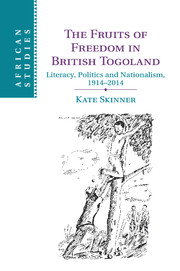Crossref Citations
This Book has been
cited by the following publications. This list is generated based on data provided by Crossref.
Hale, Matthew
Raymond, Graham
and
Wright, Catherine
2016.
List of publications on the economic and social history of Great Britain and Ireland published in 2015.
The Economic History Review,
Vol. 69,
Issue. 4,
p.
1309.
Larmer, Miles
and
Lecocq, Baz
2018.
Historicising nationalism in Africa.
Nations and Nationalism,
Vol. 24,
Issue. 4,
p.
893.
Okuda, Alison K.
2019.
Performing Ghana: the politics of being a black woman on the stage, 1966–1979.
African and Black Diaspora: An International Journal,
Vol. 12,
Issue. 1,
p.
32.
Loffman, Reuben A.
2019.
Church, State and Colonialism in Southeastern Congo, 1890–1962.
p.
259.
Nugent, Paul
2019.
Boundaries, Communities and State-Making in West Africa.
Russell, Aidan
2019.
Politics and Violence in Burundi.
KEESE, ALEXANDER
2019.
JUST LIKE IN COLONIAL TIMES? ADMINISTRATIVE PRACTICE AND LOCAL REFLECTIONS ON ‘GRASSROOTS NEOCOLONIALISM’ IN AUTONOMOUS AND POSTCOLONIAL DAHOMEY, 1958–65.
The Journal of African History,
Vol. 60,
Issue. 2,
p.
257.
MILFORD, ISMAY
2020.
FEDERATION, PARTNERSHIP, AND THE CHRONOLOGIES OF SPACE IN 1950s EAST AND CENTRAL AFRICA.
The Historical Journal,
Vol. 63,
Issue. 5,
p.
1325.
Skinner, Kate
2020.
Visions of African Unity.
p.
23.
Skinner, Kate
2020.
West Africa’s First Coup: Neo-Colonial and Pan-African Projects in Togo’s “Shadow Archives”.
African Studies Review,
Vol. 63,
Issue. 2,
p.
375.
Østebø, Terje
2020.
Islam, Ethnicity, and Conflict in Ethiopia.
Pailey, Robtel Neajai
2021.
Development, (Dual) Citizenship and Its Discontents in Africa.
Gadzekpo, Audrey
2021.
Tuning in to his-story: an account of radio in Ghana through the experience of B. S. Gadzekpo.
Africa,
Vol. 91,
Issue. 2,
p.
177.
2021.
Race and Diplomacy in Zimbabwe.
p.
346.
2021.
Revolutionary State-Making in Dar es Salaam.
p.
330.
Hern, Erin A.
2021.
Colonial Education and Women’s Political Behavior in Ghana and Senegal.
African Studies Review,
Vol. 64,
Issue. 1,
p.
217.
Distler, Werner
and
Heise, Julius
2022.
Secessionist Conflicts: Unresolved Legacies of United Nations Trusteeship.
Journal of Intervention and Statebuilding,
Vol. 16,
Issue. 2,
p.
142.
Adotey, Edem
2022.
Kwame Nkrumah: Visions of Liberation.
Canadian Journal of African Studies / Revue canadienne des études africaines,
Vol. 56,
Issue. 2,
p.
462.
Adotey, Edem
2022.
‘9th May 2017 is OUR DAY’: The Homeland Study Group Foundation and contested national imaginaries in postindependence Ghana.
Nations and Nationalism,
Vol. 28,
Issue. 2,
p.
662.
Donovan, Kevin P.
2023.
Uhuru Sasa! Federal Futures and Liminal Sovereignty in Decolonizing East Africa.
Comparative Studies in Society and History,
Vol. 65,
Issue. 2,
p.
372.





